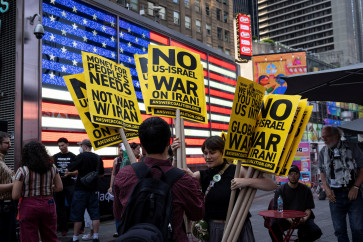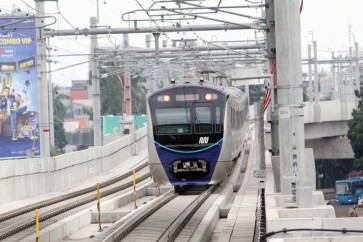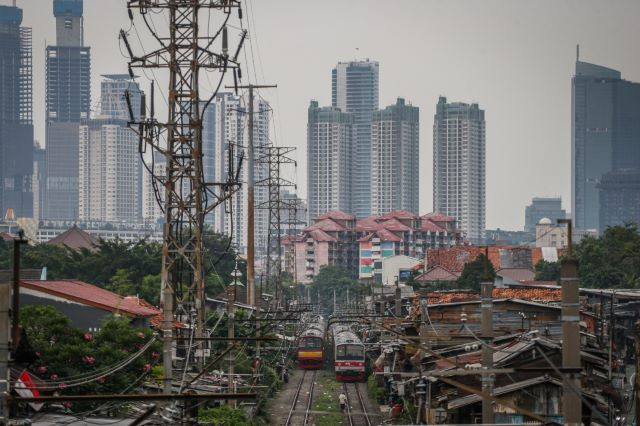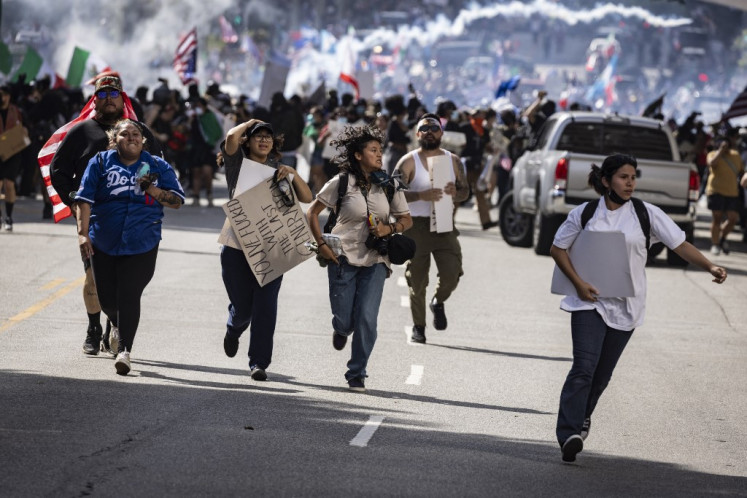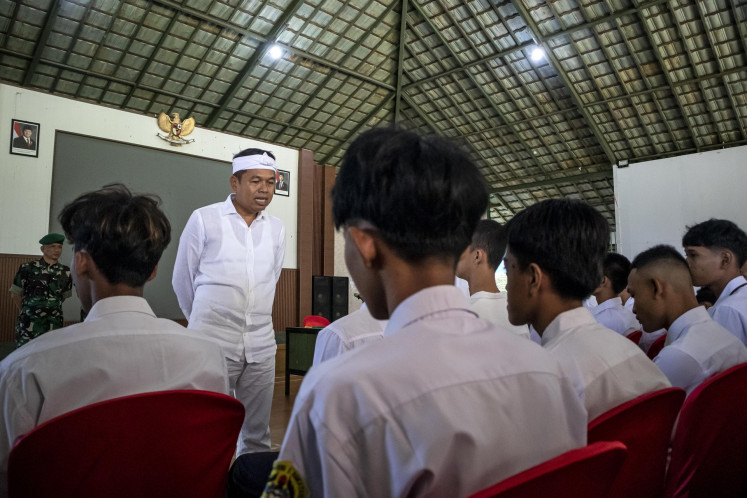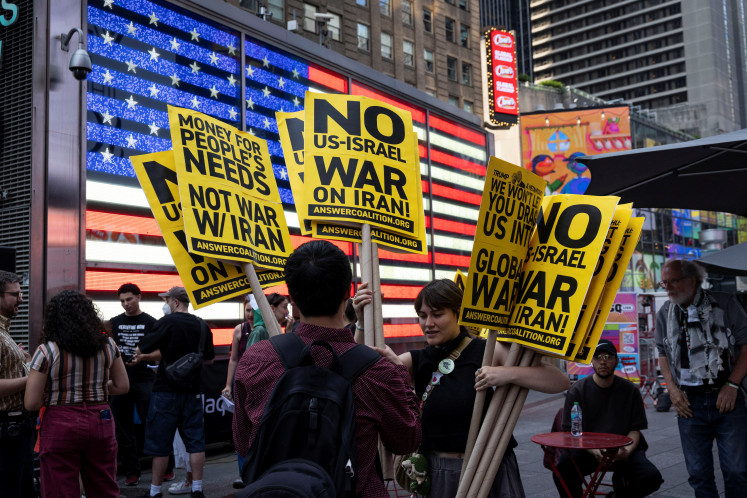Popular Reads
Top Results
Can't find what you're looking for?
View all search resultsPopular Reads
Top Results
Can't find what you're looking for?
View all search resultsASEAN's participatory agenda: Nowhere to go
The participatory agenda was in parallel with the commitment to progress with human rights in ASEAN.
Change text size
Gift Premium Articles
to Anyone
 ASEAN has turned 51 years old, but many seem to find the regional grouping strangely distant, despite the fact that people’s participation has long been part of its key agenda. (Shutterstock/File)
ASEAN has turned 51 years old, but many seem to find the regional grouping strangely distant, despite the fact that people’s participation has long been part of its key agenda. (Shutterstock/File)
A
SEAN has turned 51 years old, but many seem to find the regional grouping strangely distant, despite the fact that people’s participation has long been part of its key agenda.
The ASEAN Vision 2020 projects a “community of caring societies” that will be characterized by “greater participation of the people” and where “civil society is empowered”.
The participatory agenda was in parallel with the commitment to progress with human rights in ASEAN. The establishment of the ASEAN Intergovernmental Commission on Human Rights (AICHR) in 2009 was said to be part of efforts to create a people-oriented ASEAN.
Still, ASEAN is seen as lacking the political will to engage the people in its policy-making process. In the last eight annual reports since 2010, the Solidarity for Asian Peoples’ Advocacy (SAPA) Task Force on ASEAN and Human Rights maintained that ASEAN, including AICHR, lacked the modes and spaces for the participation of civil society organizations (CSOs).
The task force discovered that the quality of ASEAN engagement with CSOs was determined by the country chairing ASEAN, and therefore, there was no sense of trust, sustainability and predictability.
The engagement has fluctuated. ASEAN’s first engagement with CSOs came in 1998 by inviting the Working Group on ASEAN Human Rights Mechanism to the ASEAN Ministerial Meeting (AMM). In 2006, AMM expanded participation by including four national human rights institutions in the region at that time — Indonesia, Malaysia, the Philippines, Thailand and other CSOs — to develop an ASEAN human rights mechanism.
In subsequent years, ASEAN enlarged CSO participation, particularly in the process of drafting the AICHR’s terms of reference in 2008 to 2009, to include the above Mechanism, SAPA, national rights institutions and the Women’s Caucus, a network of organizations working on women’s rights in Southeast Asia.
The 1998 to 2009 period saw ASEAN prefer engaging with regional CSOs over national ones. After the AICHR was established in 2009, however, it engaged more with national CSOs and restricted the participation of regional and international CSOs.
The rule shifted again when the AICHR developed the ASEAN Human Rights Declaration in 2011 to 2012 by opening up the participation of selected national, regional and international CSOs.
In 2015, the AICHR adopted the Guideline on the Relations with Civil Society, which further limited participation only to those who are affiliated with the body.
This guideline, however, bureaucratized relations between the AICHR and CSOs, rather than create a supportive environment for civil society on human rights engagement with the AICHR.
Currently, 28 organizations have a consultative status with the AICHR. But the CSOs are prevented from contesting the policies of the ASEAN or AICHR through a strict rule to control on what (not) to say either inside the region or beyond.
Of course, these restrictions render the CSOs participation in ASEAN ineffective. Furthermore, their consultative status can be revoked for being critical to ASEAN or the AICHR. It seems that the CSOs’ consultative mechanism serves to control the behavior of the CSOs rather than encourage their meaningful participation.
So, who benefits the most from this kind of participation in the AICHR? Of course, the undemocratic governments and their government-supported NGOs.
Such government-supported NGOs have replaced the role of CSOs as watchdog, if not endorser, of the government’s actions and policy implementations.
It is not the role of CSOs to OK any government policy, decision and act. Instead, their roles are, among others, to limit and control the power of the state, raise public concern about any abuse of power, promote political participation and promote the values of democratic life such as tolerance, moderation, compromise and respect for diversity of views.
The AICHR needs CSOs to improve its role to promote and protect human rights. Rather than suspecting CSOs, the AICHR should capitalize the role of CSOs to close the gap in its inadequate legal and institutional frameworks. This shortcoming has led to the AICHR’s inability to fulfill its mandates effectively, as well as the failure to respond to human rights issues promptly.
To stay relevant, the AICHR should encourage CSOs to contribute to the strengthening of the ASEAN community. It is in the interest of the AICHR to engage with CSOs.
Promoting people’s participation is the responsibility of all institutions and sectoral bodies in ASEAN, including member states and the Secretariat. That the ASEAN Secretariat plans a gathering of all affiliated entities in ASEAN in October is good news.
ASEAN chair Singapore has been committed to ensuring the freedom of the annual ASEAN Civil Society Conference/ASEAN Peoples Forum, which will be held in November, from state interference. The government also provided the premise of the Singapore International Foundation to be used by the CSO committee for preparatory meetings.
We hope the support lasts long and amplifies more meaningful dialogues in open spaces with wider CSOs in ASEAN, including on human rights.
***
The writer is a PhD researcher at the Erasmus University Rotterdam’s International Institute of Social Studies in the Netherlands and senior adviser at the Human Rights Working Group in Jakarta.



